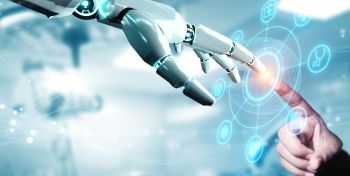Business School news
Read news relating to the University of Sussex Business School.
Research Spotlight: living and working with AI
By: Chimezie Anajama
Last updated: Tuesday, 16 July 2024

How is artificial intelligence (AI) transforming our world and, what are the challenges we face living and working alongside it? Our researchers are focusing on the opportunities and risks we face with AI and digital technologies. On this International AI Day, we share some expert insights into AI and the future of work, and the effects of AI on global healthcare.
Urgent need for policymakers to address the impact of AI on the workplace
Professor Maria Savona and her team are analysing millions of patents and scientific publications to predict and understand the AI of 2030. This knowledge is critical for predicting future labour skills and demand, and to ensure that the societal consequences of AI are beneficial, sustainable and just. According to Savona, UK firms are also currently lagging behind other countries in their adoption of AI for non-routine cognitive tasks. This may risk significant UK economic gain.
Could your next job interview be performed using AI?
How would you feel if your next job interview required you to talk only to a camera, and then your answers were assessed by an algorithm rather than a person? Jobseekers have described this experience as disorientating and stressful. In response to this Dr Zahira Jaser and Professor Dimitra Petrakaki have produced a toolkit for approaching AI job interviews. It aims to support jobseekers, digital platforms and employers.
AI and healthcare
Professor Chirantan Chatterjee, Dr Benjamin Marent, and Professor Ana Isabel Canhoto bring new perspectives to how AI is deployed in global healthcare.
Focusing on how AI is used with patients, Chatterjee partners with an Indian mental health app – TickTalkTo – and finds that app users are more likely to engage when messages are presented in a human tone. By contrast, messages from an impersonal system, like chatbots, tend to make users less responsive.
Marent’s research also focuses on patients’ well-being and digital health. He assesses the distinct qualities of doctor-patient interactions that occur face-to-face, over the telephone, and through digitised platforms. Through this, he tries to understand the redefined roles and responsibilities the integration of digital technologies in healthcare requires.
Canhoto explores the growing use of generative AI by people with chronic health conditions. Although sources like ChatGPT could sound highly convincing, they frequently produce misleading outputs. This can cause confusion and strain limited healthcare resources. She is developing guidance to steer people towards more trustworthy digital resources.